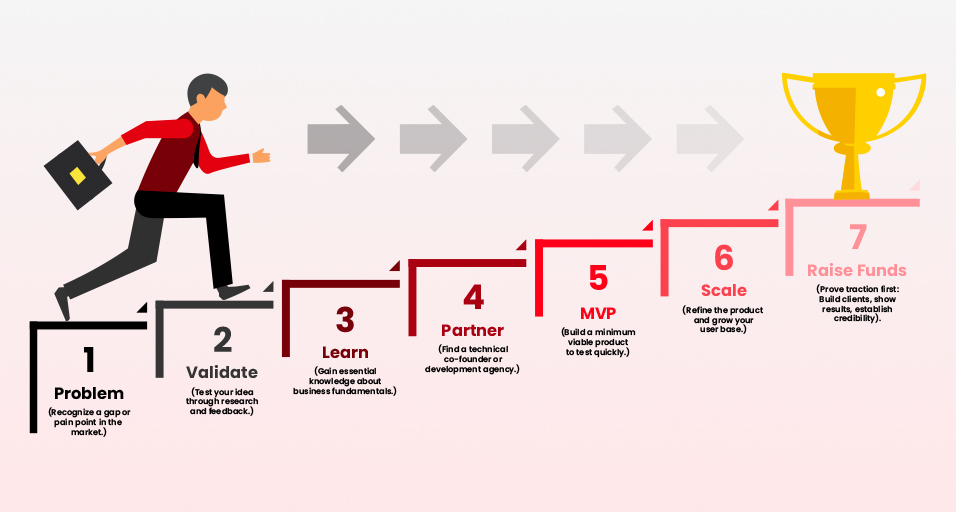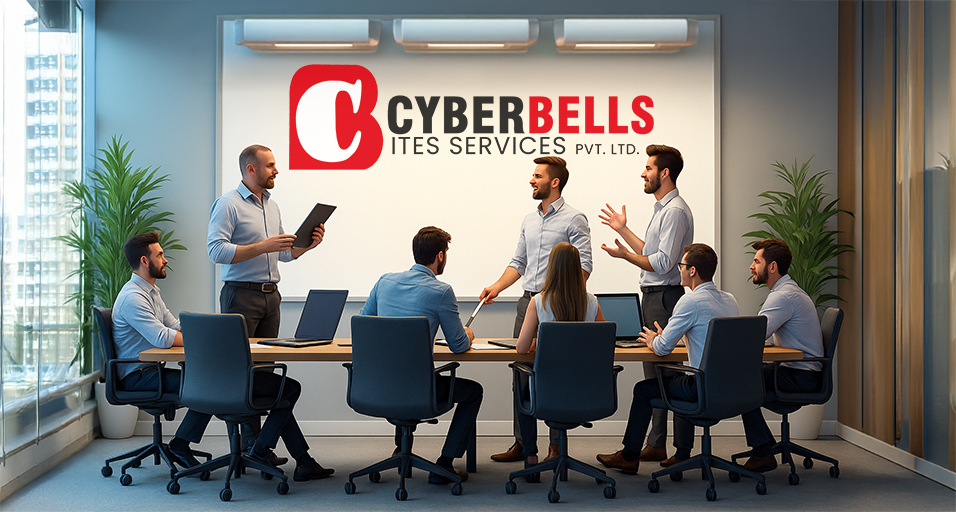How to Start a Tech Company without a Tech Background?

Starting a tech company without having a tech background is possible. What you need is a strong business mindset, problem-solving skills, the right tools, and collaborative partners to bring your vision to life.
In this blog, we will walk you through practical steps to build your tech company from the ground up, just like we did at Cyberbells.
What You Will Learn From The Blog
This is your blueprint for launching a tech company without coding knowledge, step by step.
- What Stops Non-Tech Founders From Starting Their Tech Journey?
- Busting the myth: Do You Need Coding Skills to Launch a Tech Startup?
- A Step-by-Step Guide For Non-Tech Founders: Building a Tech Company Without a Tech Background.
- The Cyberbells Journey: How We Built a Digital Solutions Company Without Coding
- Why Non-Tech Founders Shouldn’t Hold Back Anymore
What Stops Non-Tech Founders From Starting Their Tech Journey?

Starting a tech company is a dream for many ambitious entrepreneurs. Many great startup ideas never see the light of day because their founders don’t have technical knowledge. The thought of writing thousands of lines of code, debugging errors, or even managing developers can feel overwhelming. Most non-tech founders hold back not because their ideas lack potential but because of these common barriers:
- Fear of Technical Gaps
- Overthinking Competition
- Unclear Roadmap
- Self Doubt
But here’s the truth: Tech businesses aren’t built by coding alone, but by how you execute the idea. You don’t need to be a coder to start a tech company because tech is built by solving a problem, creating demand, and scaling more.
Bursting the myth: Do You Need Coding Skills to Launch a Tech Startup?

The clear short answer to this is No. A common misconception that holds many non-tech founders back is that you must be able to code to start a tech company.
The truth? Coding is just one skill, not the entire skill set required for success in a tech startup.
What matters is:
- Vision to identify real-world problems
- Creativity to find a solution and use available tools
- Domain Expertise
- Knowledge about design, sales, business, and customer psychology.
- Courage & Persistence
- Good Team & Collaborations
- Willingness to learn continuously
Most successful tech startups don’t become industry leaders because they wrote the best code. They succeed because they solve problems effectively, deliver results, and scale smartly.
A Step-by-Step Guide for Non-Tech Founders: Building a Tech Company Without a Tech Background

Building a tech company without a tech background isn’t just possible; it is increasingly common. With the right strategy, validation, and team collaborations, non-tech founders can turn ideas into thriving businesses.
Here’s a practical step-by-step blueprint to guide you from concept to execution:
1. Identify a problem to solve:
Every successful tech company starts with a problem worth solving. We do not focus on the code or technical things, just ask yourself –
- What problems/frustrations do people face daily?
- Do people desperately need a solution for the existing problem?
- Will people pay for the solution?
- Will technology craft a perfect solution for them?
The larger the problem, the stronger your foundation is. Study the challenges faced by people and then craft a solution.
2. Validate your idea before:
After identifying the problem and before spending time and money on building it, idea validation is a really important step. Test if your idea has real demand.
- Talk to potential users.
- Run quick surveys.
- Share mockups or landing pages.
Validation ensures you’re building something people actually need, even without coding a product.
3. Gain knowledge about Business:
As a non-tech founder, your strengths lie in vision and execution. To balance technical gaps, you need to double down on:
- Domain expertise
- Business strategy and models
- Sales and Marketing
- Design thinking
- Customer psychology
These skills not only help you run a company, but also make you investor-ready.
4. Find a Tech Partner
You do not need to become a developer; you just need the right partner to work with. Look for someone:
- Who believe in your idea and have a strong technical side.
- Freelancers or agencies to build the first vision.
- Or use no-code tools to kick start things.
Great companies are not built alone; collaboration is the key. You need to combine the best of what you have with the best of what your co-founder offers to create an amazing product.
5. Build an MVP (Service or Solution)
MVP is the simplest form of your idea, which solves just the core problem. Do not run behind perfection; just build enough that it solves the problem. Using this approach helps:
- Saves money and time
- Gets you to access the market fast
- Know about real user feedback
- Gives you an idea about where your product lacks
Think of this as a test run of your product, and learn from this. This will help you create the best of your product.
6. Keep Scaling
Once your MVP is live, listen to what your users have to say about it. What are the things they love? What is missing?
- Improve features based on feedback
- Build your brand identity
- Focus on the negative points
- Focus on long-term growth rather than perfection
This will help you scale and refine your product. Growth does not happen overnight; it is based on constant iteration.
7. Raise Funds
Now this is the step, non-tech founders jump at really fast: Chasing the investors. But funding comes after traction. Focus first on:
- Building a client base
- Demonstrating results
- Establishing credibility
Always remember, investors just don’t fund the idea; they fund the vision, execution, and results. You have to prove your credibility first, and then they will trust your idea.
The Cyberbells Journey: How We Built a Digital Solutions Company Without Coding

When the idea of cyberbells first came to mind, one thing was clear: we were not developers, we were not product architects, and we definitely did not spend years learning how things worked in the tech industry.
We simply saw a gap in the market. We noticed how companies were losing opportunities because of weak digital presence and inefficient workflows. And that problem stuck with us.
But again, like every non-tech founder, we had our doubts. So, instead of jumping into building something, we spoke to dozens of businesses, observed them closely, and their frustrations validated what we suspected: most companies wanted digital growth but did not know where to start.
With that validation, we focused on what mattered the most:
Business strategy, client communication, and execution.
While we did not write code ourselves, we built a team of designers, developers, and marketers to execute our vision.
Our MVP was not a “product”, rather it was services. By starting small, fixing broken websites, improving UI/UX, and delivering measurable results, we:
Built client trust, Learned what works in real business scenarios, and iterated and improved continuously.
From there, we scaled, hiring the right team, expanding our areas of service, and delivering consistent results. Instead of just providing solutions, we became partners in the growth of our clients.
We didn’t start with a perfect roadmap. There were doubts, setbacks, and days when the vision felt too big. Looking back now, Cyberbells did not grow because we were coders. It grew because we understood problems, validated them, collaborated with the right people, and executed consistently.
Today, we help businesses of all sizes achieve digital growth, proving that non-tech founders can build successful tech companies with strategy, vision, and execution.
Why Non-Tech Founders Shouldn’t Hold Back Anymore

Starting a tech company without a tech background is not only possible, it can even be an advantage. Non-tech founders bring fresh perspectives, business insights, and creative problem-solving skills that coders alone may not have.
If you’re a non-tech founder dreaming of starting your own tech venture, know this: you don’t need to write code to build something impactful. What you need is vision, persistence, and the courage to take the first step, just like we did.
And when you’re ready to scale your vision into something bigger, companies like Cyberbells are here to support you with development, design, and growth strategies.
But your first step doesn’t need us. Your first step is simply: start today.
FAQs
Q. How can a non-tech founder start a tech company without experience?
Non-technical founders can launch a tech company by focusing on problem-solving skills rather than coding. Start by learning and identifying a real market problem, validating your idea with potential users, and creating a basic product ( MVP) using no-code tools or service-based solutions. From there, collaborate with a reliable technical partner or team to scale.
Q. Do you need to learn coding to run a tech company?
No, you do not need to be a programmer or developer to run a successful tech business. Instead, focus on understanding the basics of technology, product development, and business models. Pair that knowledge with a strong technical co-founder or a partner who can understand your vision and translate it into execution.
Q. Where can non-tech founders get feedback for their ideas?
The best feedback can come directly from potential customers. Talk to your target audience, run surveys, create a landing page to test demand, and observe how users interact with prototypes or demos. Early feedback ensures you’re building something people actually want.
Q. What is domain expertise in startups?
Domain expertise means having deep knowledge and insights about the industry you want to build in, its challenges, customer behaviour, and market gaps. For non-tech founders, it builds credibility, helps you design solutions that users need, and gives you an edge with the investors.
Q. How can non-tech founders gain domain expertise?
You can gain domain expertise by:
- Researching your industry thoroughly
- Networking with industry experts and mentors
- Attending workshops, conferences, and webinars
- Speaking directly with potential customers
- Learning from competitors’ successes and failures
These things help you see the industry from every angle.
Q. Where can you find a technical team or collaborators for your startup?
Non-tech founders can find technical partners through:
- Freelance platforms
- Startup communities
- Hackathons and networking events
- LinkedIn or local meetups
- Tech-focused accelerators and incubators
You can also use no-code tools to launch quickly, then onboard collaborators as your vision grows.
Q. What is an MVP in a startup?
MVP stands for Minimum Viable Product, the simplest version of your product that solves the core problem for your target audience. Instead of building a complex platform, focus on a few key features that validate your idea. A strong MVP lets you test demand, gather user feedback, and attract early investors.
Want to Learn More About Building an MVP Without Coding?
Stay tuned for our upcoming blog where we’ll share a detailed step-by-step guide, practical tools, and essential tips for non-tech founders. Learn how to start a tech company without a tech background by building your first Minimum Viable Product and turning ideas into reality.
Q. Do non-tech founders need a technical co-founder?
While not mandatory, having a technical co-founder is a huge advantage. They bring coding and product development expertise, balance your business skills, and help you avoid costly outsourcing mistakes. If you do not find one initially, start with no-code tools or freelancers, but aim to bring a technical partner on board long term.
Q. How much does it cost to start a tech company without coding?
Startup costs vary widely, but non-tech founders can save money by:
- Building an MVP with no-code platforms
- Starting with a service-based model before scaling to software
- Outsourcing specific technical needs instead of hiring full-time staff
Many non-tech founders launch with a few thousand dollars before raising outside investment. The key is validating your idea before heavy spending.
Q. How can non-tech founders attract investors?
As we mentioned in the blog, investors do not just fund ideas; they fund traction, teams, and vision. As a non-tech founder, you can attract investors by:
- Validating your idea with paying customers or active users
- Building a strong founding team ( business + technical balance)
- Clearly demonstrating your domain expertise and market opportunity
- Creating a roadmap that shows scalability
- Showing early MVP results, even with no-code solutions
